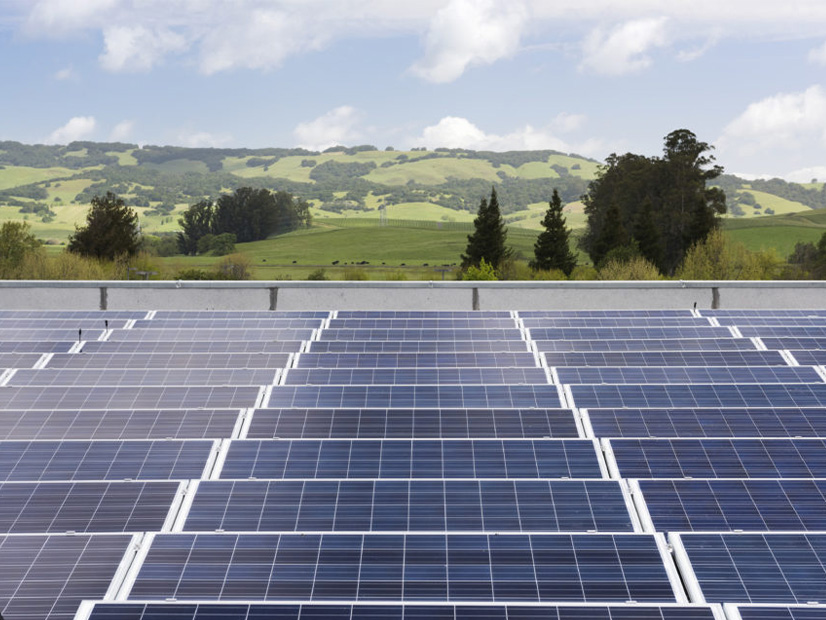
FERC on Thursday declined to rehear a case on NYISO’s Order 2222 compliance filing but clarified its comments from a June order on aggregated distributed energy resources providing ancillary services in the ISO (ER21-2460).
The commission reached a similar conclusion in CAISO’s Order 2222 compliance in an order also approved Thursday, during its monthly open meeting (ER21-2455). It denied a rehearing request by environmental and consumer groups but responded to a request by California utilities to clarify that its June order did not “modify or reverse commission precedent that wholesale sales by net metering customers are subject to commission jurisdiction.”
CAISO and NYISO were among the first to submit compliance filings last year under Order 2222, which FERC approved in September 2020 to remove barriers to the participation of DER aggregations in the capacity, energy and ancillary service markets of RTOs and ISOs.
In the NYISO case, FERC partially accepted NYISO’s Order 2222 compliance filing on June 16 but directed the ISO to file revisions related to small utility opt-in requirements, interconnection rules and other issues. (See FERC Partially Accepts NYISO Order 2222 Compliance.)
NYISO responded on July 18 with a request that FERC clarify the discussion in its June order on aggregated DERs providing ancillary services or grant it a rehearing. The ISO had proposed in its compliance filing that aggregations could provide certain ancillary services only if all of the individual DERs in the aggregation were able to provide the same ancillary service.
In its June 17 order, FERC said that “so long as some of the DERs in the aggregation can satisfy the relevant requirements to provide certain ancillary services (e.g., the one-hour sustainability requirement), we find that those DERs should be able to provide those ancillary services through aggregation, in accordance with the goal of Order No. 2222 to allow distributed energy resources to provide all services that they are technically capable of providing through aggregation.” Being “‘technically capable’ of providing a service means meeting all of the technical, operational and/or performance requirements that are necessary to reliably provide that service.”
NYISO said its system software allows aggregated DERs to provide only one ancillary service at a time, such as operating reserves, and asked FERC if it intended otherwise.
FERC said the ISO’s software limitations meant the resources were technically incapable of providing certain services and that its June 17 order did not “require NYISO to allow a heterogeneous aggregation to simultaneously make available multiple operating reserve products.”
The commission denied rehearing requests by clean energy and consumer advocates, including the Natural Resources Defense Council and Advanced Energy Economy, which argued that NYISO’s definition of a DER was not technology-neutral, as required by Order 2222, and could prohibit energy efficiency and other passive-demand resources from participating in its capacity market even though they are technically capable of doing so.
FERC disagreed with that argument, as it had in its June decision.
“NYISO’s proposal includes a technology-neutral definition for DER and therefore does not prohibit any type of technology from participating in an aggregation,” it said.
Commissioner Allison Clements dissented in part “because [the decision] affirms the majority’s prior finding that [NYISO] may exclude energy efficiency from participating in distributed energy resource aggregations without running afoul of the requirements of Order No. 2222.”
“I disagree with that decision and therefore would have granted the request for rehearing on this issue submitted by [the] clean energy and consumer advocates and found that NYISO’s definition of DER does not comply with Order No. 2222,” Clements wrote.
CAISO Clarification
In June, FERC asked CAISO to file a further Order 2222 compliance filing addressing concerns about its model for aggregated distributed energy resources, rules for participation of DERs that are customers of small utilities and other matters. (See CAISO Order 2222 Filing Needs Some Work, FERC Says.)
On July 15, Southern California Edison, Pacific Gas and Electric, and San Diego Gas & Electric submitted a request to FERC for clarification of the compliance order, which the commission granted.
The “California utilities seek clarification that the compliance order does not modify or reverse commission precedent that wholesale sales by net metering customers are subject to commission jurisdiction,” FERC said. “They argue that clarification is needed because a wholesale sale is a sale for resale in interstate commerce subject to commission jurisdiction, whether the seller is behind or in front of a retail meter. …
“They contend that, if commission policy is modified or overturned, then wholesale sales may no longer be subject to commission jurisdiction.”
In its order, FERC said that “as [the] California utilities request, we clarify that … the compliance order does not reverse or otherwise modify commission precedent.”
FERC also denied AEE’s request for rehearing of the CAISO compliance order. AEE argued that “the barriers created by the 24-hour settlement requirement run afoul of the provisions of Order No. 2222 requiring each RTO/ISO ‘to allow distributed energy resource aggregators to register distributed energy resource aggregations under one or more participation models in the RTO’s/ISO’s tariff that accommodate the physical and operational characteristics of the distributed energy resource aggregation,’” according to FERC.
The commission said it had already addressed AEE’s argument in its prior rulings, and “we remain unpersuaded by its claims on rehearing.”


